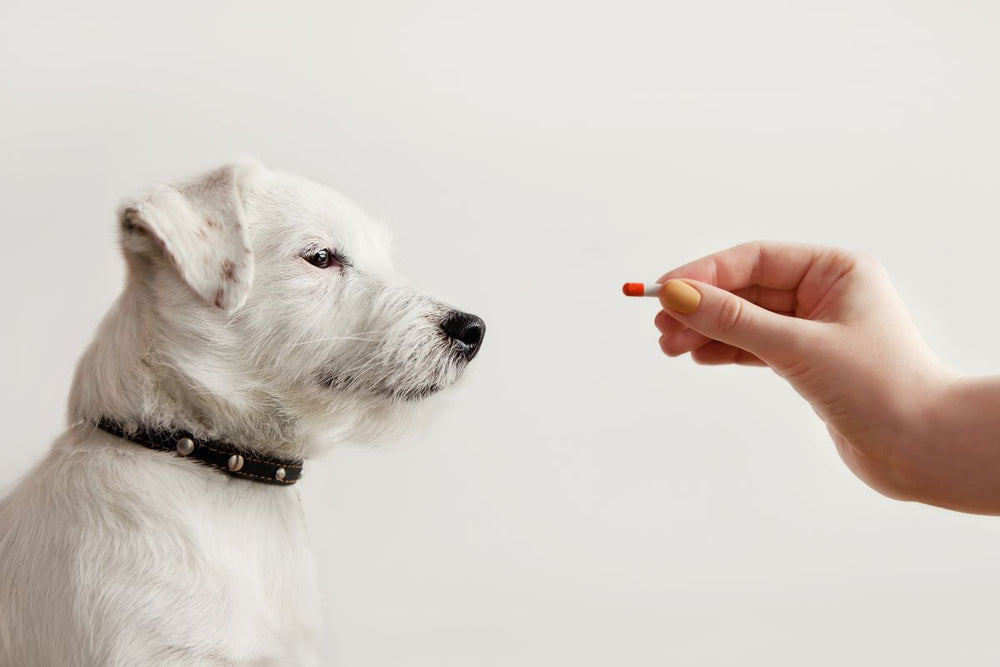By: Dr. Juli, DVM @itsDrJuli
Most dogs will experience diarrhea or loose stool during their lifetime. While upset stomachs and dumpster-diving pups often go hand and hand, there are countless other reasons why your dog may be experiencing diarrhea. Common reasons include dietary changes, stress, viruses, intestinal parasites, or other underlying health problems, like allergies, colitis, or irritable bowel syndrome. No matter the cause, pet parents naturally want to find relief for their four-legged friend’s upset stomach. While reaching into your own medicine cabinet to relieve your pet’s diarrhea may be tempting, common human anti-diarrheal medications, like Imodium A-D, could harm your dog’s health and wellness.

What is Imodium A-D?
Imodium A-D is the brand name for the over-the-counter (OTC) human anti-diarrheal drug, loperamide, available in capsule, caplet, or liquid form. This synthetic opioid is taken by mouth to increase muscle tone in the small intestine and prevent food from moving too quickly through the gut. The result is better absorption of water, electrolytes, and nutrients and decreased diarrhea episodes. Loperamide does not provide pain control, nor does it cause the common side effect of euphoria, which is typically experienced from opioids like morphine or oxycodone. Many people include Imodium in their home first-aid kits because it works quickly and is well-tolerated by most people.
Is it Safe to Give Your Dog Imodium?
Although Imodium may be well tolerated or helpful for some dogs with diarrhea, never give your dog any OTC or prescription human medications unless advised by your veterinarian. Following a veterinary consultation for your dog’s diarrhea, loperamide may be prescribed as an off-label medication, which is not uncommon in veterinary medicine. However, dog dosing instructions often differ from those recommended for human use.
Although Imodium is safe for dogs in certain circumstances, while under veterinary guidance, some dogs may experience potentially serious side effects, including bloating, constipation, pancreatitis, or severe sedation. Also, inform your veterinarian if your pet takes any vitamins, supplements, or prescription medications because some may have dangerous side effects when combined with Imodium. Never give your dog loperamide if they are taking any of the following medications:
- Heart medications (e.g., propranolol)
- Monoamine Oxidase Inhibators (e.g., selegiline)
- Certain antibiotics (e.g., erythromycin, sulfamethoxazole)
- Immuno-modulators (e.g., cyclosporin)
- Antifungal medications (e.g., ketoconazole)
- Behavioral drugs (e.g., imipramine)
- Antihistamines (e.g., diphenhydramine)
- Sedatives (e.g., trazodone)
Never give Imodium to pets experiencing diarrhea from a toxin, infection, or virus, like parvovirus. Loperamide should also be used cautiously in dogs with certain medical conditions, so ensure to inform your veterinarian if your dog has been previously diagnosed with any of the following:
- Liver disease
- Kidney disease
- Addison’s ( i.e., hypoadrenocorticism)
- Lung disease or breathing problems
- Head injuries
- Hypothyroidism
- MDR1 (ABCB1) genetic mutation ( found in the following dog breeds: collies, collie-type breeds, and herding breeds, like Shetland sheepdogs and Australian shepherds)
- Young or nursing puppies
- Senior dogs
- Pregnant dogs
Does My Dog Need a Veterinary Exam for Diarrhea?
It’s not uncommon for pet parents to rush to the vet at the first sign of a problem with their pup. While bringing your dog for regular veterinary visits is always a good idea, some issues may not require emergency or immediate veterinary care. Dogs with mild diarrhea, loose stool, and no other severe mood changes can usually be monitored for 24 hours to see if the problem resolves. Like humans, some pups may experience an upset stomach from eating something that does not agree with them.

Bring your dog to your DVM immediately if they are showing diarrhea with any of the following signs:
- Bloody diarrhea
- Diarrhea, or loose stool that lasts more than 24 – 48 hours
- Vomiting
- Bloating or abdominal pain
- Lethargy
- Fever
- Attempts to vomit that do not result in any vomitus
- Decreased appetite
- Straining during defecation
How to Support Your Dog When They Have Diarrhea
Diarrhea can lead to dehydration in your pet, so ensure your dog has access to plenty of fresh, clean water. Adding a supplement, like Bone Broth, to their water dish can encourage them to drink more while providing added nutrients they may have lost following an episode of diarrhea. Your veterinarian may also advise you to add fiber to your dog’s diet to help firm their stools. Pumpkin Powder is an easily digestible fiber source that can be sprinkled over your dog’s food.
Other ways to support your pup when they have diarrhea include:
- Giving your dog a probiotic to help reset their gut microflora.
- Giving your dog a veterinary-prescribed monthly parasite prevention medication to prevent parasite-induced diarrhea.
- Feeding your pup a bland diet with foods like white rice, boiled chicken, etc.
- Feeding your dog a prescription diet to help calm their gastrointestinal system.
- Preventing your dog from eating pet-toxic food or garbage by dog-proofing all household garbage bins.



